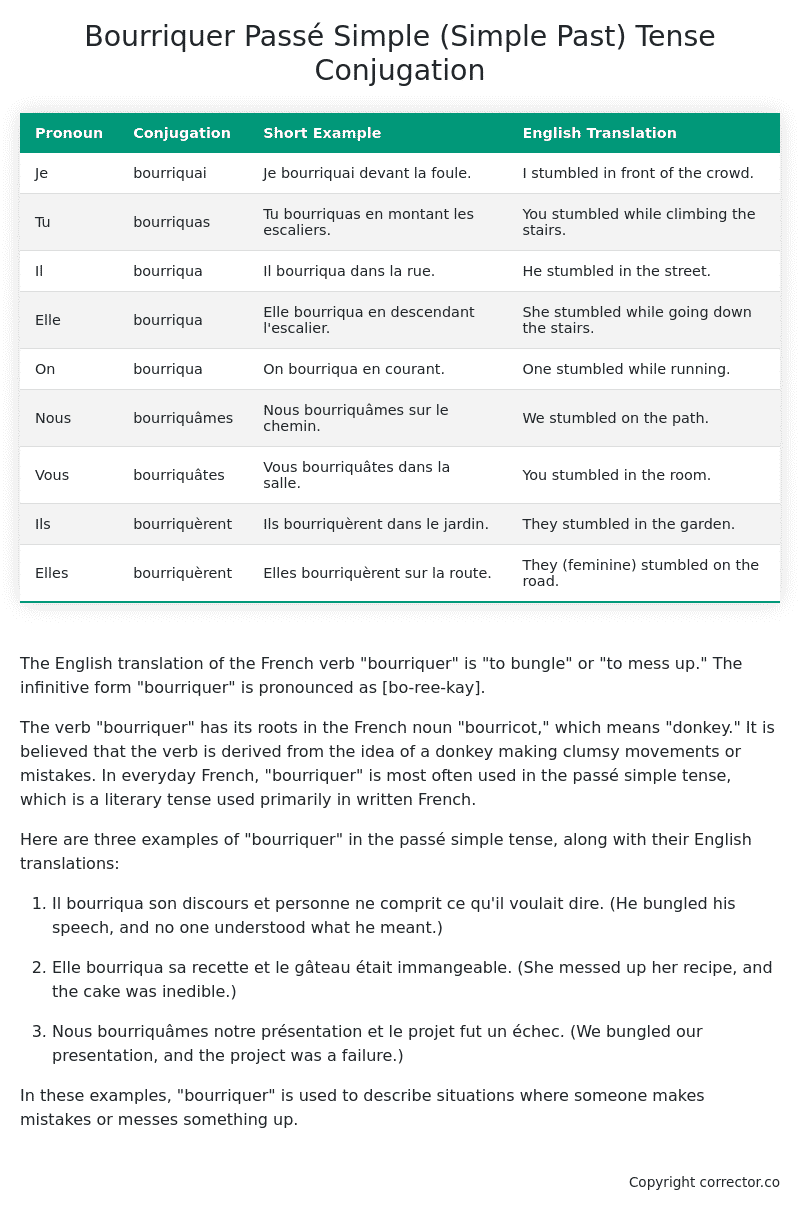Passé Simple (Simple Past) Tense Conjugation of the French Verb bourriquer
Introduction to the verb bourriquer
The English translation of the French verb “bourriquer” is “to bungle” or “to mess up.” The infinitive form “bourriquer” is pronounced as [bo-ree-kay].
The verb “bourriquer” has its roots in the French noun “bourricot,” which means “donkey.” It is believed that the verb is derived from the idea of a donkey making clumsy movements or mistakes. In everyday French, “bourriquer” is most often used in the passé simple tense, which is a literary tense used primarily in written French.
Here are three examples of “bourriquer” in the passé simple tense, along with their English translations:
-
Il bourriqua son discours et personne ne comprit ce qu’il voulait dire.
(He bungled his speech, and no one understood what he meant.) -
Elle bourriqua sa recette et le gâteau était immangeable.
(She messed up her recipe, and the cake was inedible.) -
Nous bourriquâmes notre présentation et le projet fut un échec.
(We bungled our presentation, and the project was a failure.)
In these examples, “bourriquer” is used to describe situations where someone makes mistakes or messes something up.
Table of the Passé Simple (Simple Past) Tense Conjugation of bourriquer
| Pronoun | Conjugation | Short Example | English Translation |
|---|---|---|---|
| Je | bourriquai | Je bourriquai devant la foule. | I stumbled in front of the crowd. |
| Tu | bourriquas | Tu bourriquas en montant les escaliers. | You stumbled while climbing the stairs. |
| Il | bourriqua | Il bourriqua dans la rue. | He stumbled in the street. |
| Elle | bourriqua | Elle bourriqua en descendant l’escalier. | She stumbled while going down the stairs. |
| On | bourriqua | On bourriqua en courant. | One stumbled while running. |
| Nous | bourriquâmes | Nous bourriquâmes sur le chemin. | We stumbled on the path. |
| Vous | bourriquâtes | Vous bourriquâtes dans la salle. | You stumbled in the room. |
| Ils | bourriquèrent | Ils bourriquèrent dans le jardin. | They stumbled in the garden. |
| Elles | bourriquèrent | Elles bourriquèrent sur la route. | They (feminine) stumbled on the road. |
Other Conjugations for Bourriquer.
Le Present (Present Tense) Conjugation of the French Verb bourriquer
Imparfait (Imperfect) Tense Conjugation of the French Verb bourriquer
Passé Simple (Simple Past) Tense Conjugation of the French Verb bourriquer (You’re reading it right now!)
Passé Composé (Present Perfect) Tense Conjugation of the French Verb bourriquer
Futur Simple (Simple Future) Tense Conjugation of the French Verb bourriquer
Futur Proche (Near Future) Tense Conjugation of the French Verb bourriquer
Plus-que-parfait (Pluperfect) Tense Conjugation of the French Verb bourriquer
Passé Antérieur (Past Anterior) Tense Conjugation of the French Verb bourriquer
Futur Antérieur (Future Anterior) Tense Conjugation of the French Verb bourriquer
Subjonctif Présent (Subjunctive Present) Tense Conjugation of the French Verb bourriquer
Subjonctif Passé (Subjunctive Past) Tense Conjugation of the French Verb bourriquer
Subjonctif Imparfait (Subjunctive Imperfect) Tense Conjugation of the French Verb bourriquer
Subjonctif Plus-que-parfait (Subjunctive Pluperfect) Tense Conjugation of the French Verb bourriquer
Conditionnel Présent (Conditional Present) Tense Conjugation of the French Verb bourriquer
Conditionnel Passé (Conditional Past) Tense Conjugation of the French Verb bourriquer
Conditionnel Passé II (Conditional Past II) Tense Conjugation of the French Verb bourriquer
L’impératif Présent (Imperative Present) Tense Conjugation of the French Verb bourriquer
L’impératif Passé (Imperative Past) Tense Conjugation of the French Verb bourriquer
L’infinitif Présent (Infinitive Present) Tense Conjugation of the French Verb bourriquer
L’infinitif Passé (Infinitive Past) Tense Conjugation of the French Verb bourriquer
Le Participe Présent (Present Participle) Tense Conjugation of the French Verb bourriquer
Le Participe Passé (Past Participle) Tense Conjugation of the French Verb bourriquer
Struggling with French verbs or the language in general? Why not use our free French Grammar Checker – no registration required!
Get a FREE Download Study Sheet of this Conjugation 🔥
Simply right click the image below, click “save image” and get your free reference for the bourriquer Passé Simple tense conjugation!

Bourriquer – About the French Passé Simple (Simple Past) Tense
Formation
Usage
Narration
Historical Context
Interactions with other tenses
Passé Composé
Imparfait
Conditional and Subjunctive
Summary
I hope you enjoyed this article on the verb bourriquer. Still in a learning mood? Check out another TOTALLY random French verb conjugation!


